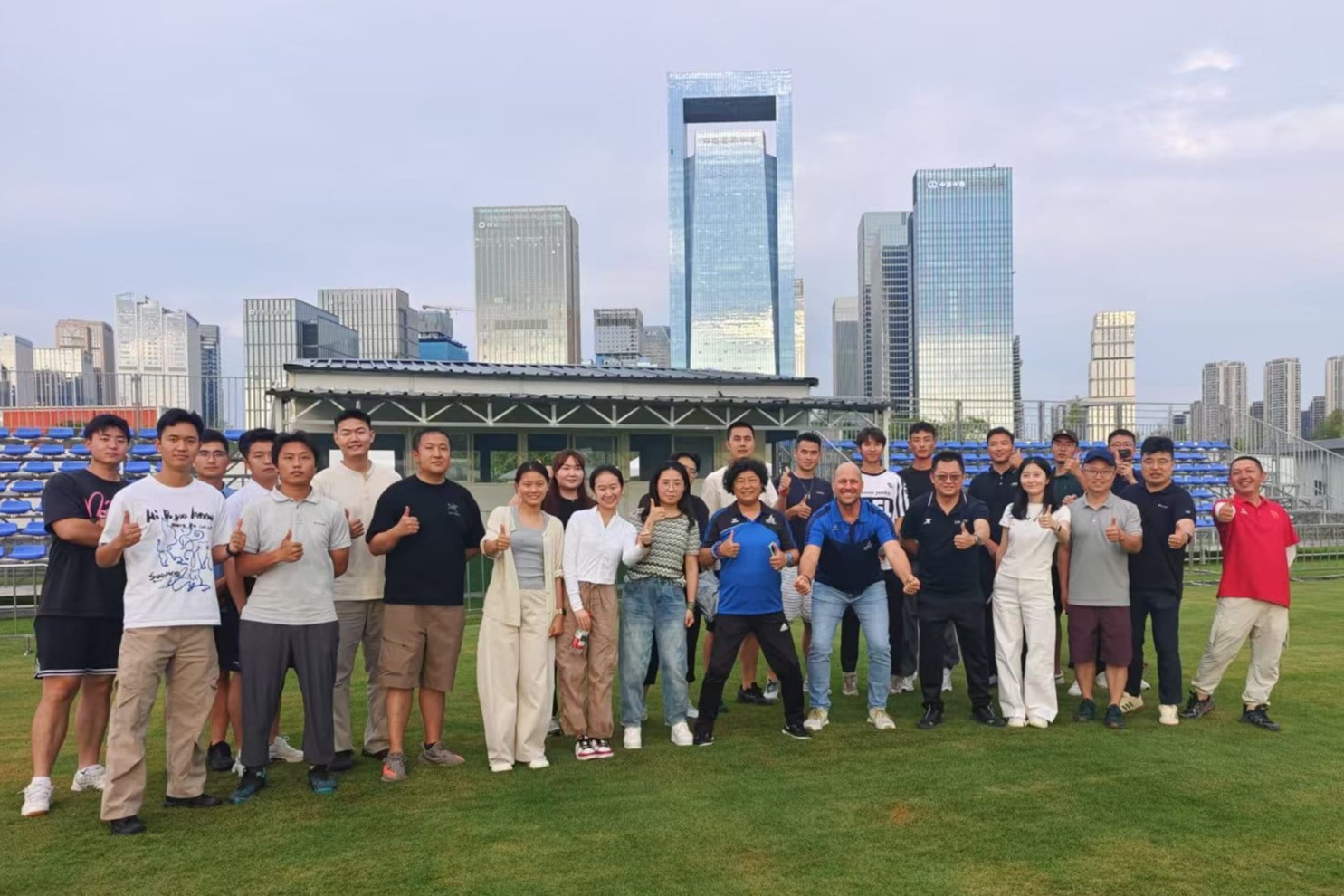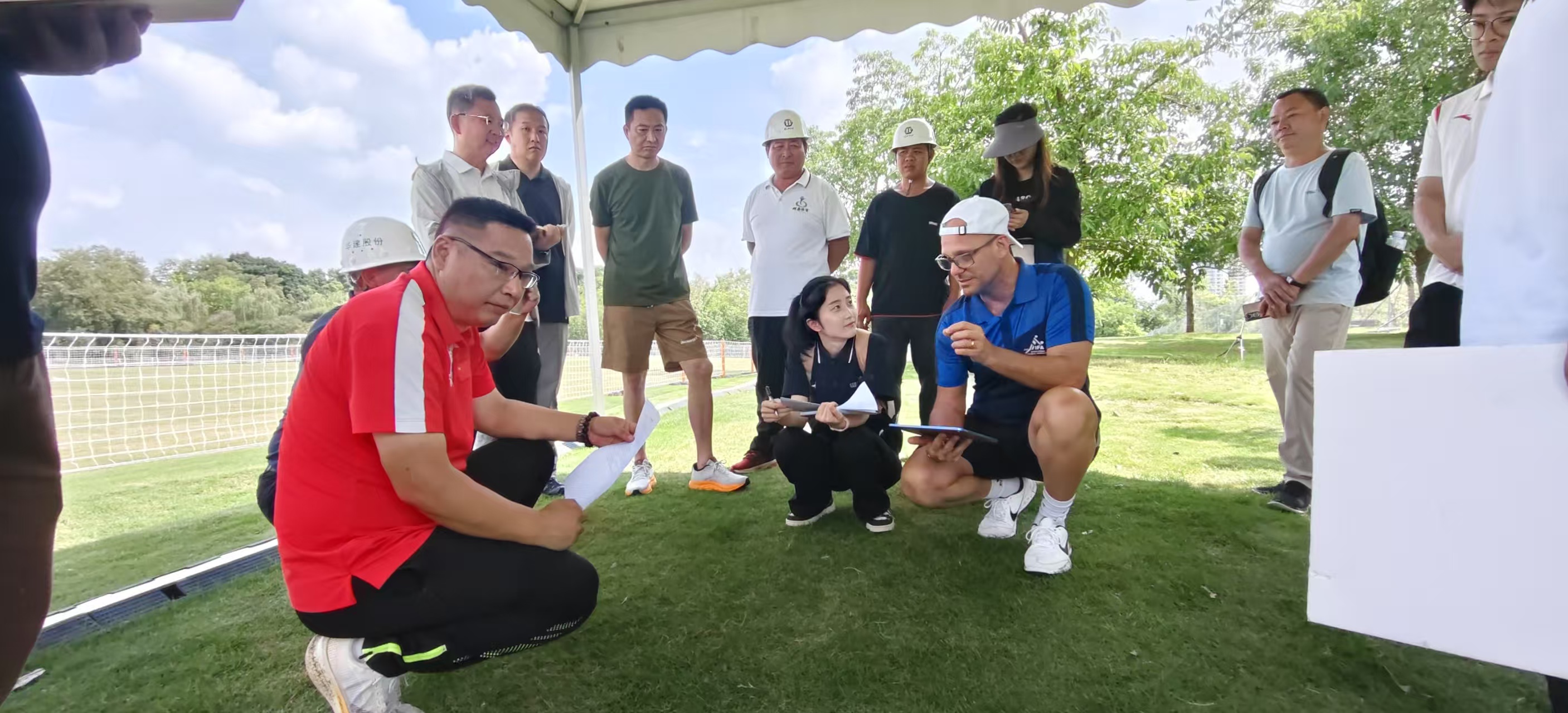The countdown is on: in just five weeks, the World Games 2025 will officially begin in Chengdu, China. Among the sports featured are the fistball competitions, scheduled to take place from August 9 to 13 in the heart of the city’s scenic Tianfu Park. With less than a month to go, preparations by the Local Organizing Committee (LOC) have reached the final stretch — and a key milestone was marked last week with a final venue inspection by International Fistball Association (IFA) Sports Director and Technical Delegate, Gastao Englert.
Englert visited the newly built fistball venue and met with various members of the Chinese organizing team to review all aspects of the tournament setup. The venue, which features specially adapted natural grass courts for both match play and warm-ups, is nearly complete. “Both the match and the practice/warm-up fields are in good condition and could be used today,” Englert noted. “We are now fine-tuning details such as grass density and bounce quality, but overall, we are in excellent shape.”
One of the event’s defining features will be its setting: the fistball matches will take place in the middle of a public park, offering spectators and passersby an opportunity to witness world-class sport in an open and accessible environment. With eight teams in both the men’s and women’s competitions – more than ever before – the sport is gaining unprecedented visibility at the World Games.
The venue will also include athlete and media zones, as well as individual team tents — highlighting the LOC’s commitment to both professionalism and comfort. As part of the local integration effort, a group of PE teachers from Chengdu, trained through a combination of webinars and hands-on sessions, will serve as line referees and recording clerks. A practical training session was recently held directly on-site, following earlier online instruction.
This engagement reflects a broader ambition: using the World Games as a launchpad for fistball development in China. According to Englert, the groundwork being laid today could soon lead to the formation of Chinese national youth teams — with the goal of fielding boys’ and girls’ squads at the 2026 U18 World Championship in Switzerland.
Interview with Gastão Englert
Last week, you visited Tianfu Park in Chengdu once again to do a final check of the newly constructed fistball courts. What is your impression of the current state of preparations one month before the start of the World Games?
My impression is the best possible. It has been a very positive surprise to see how professional, results-oriented, and available the Chinese team is — and most importantly, how willing they are to do everything necessary to solve any issue that arises. Both the match and the practice/warm-up fields are in good condition and could be used today. We are now working on the final details regarding the grass and bounce rebound, which are also in a good stage. Beyond the fields, the overall structure is impressive and already 95% complete. This includes a private tent for each team, as well as dedicated areas for athletes and media.
The fistball competitions will take place on specially adapted natural grass fields in the middle of a public park. What kind of atmosphere can teams expect?
The city of Chengdu is inclusive, democratic, and focused on community and well-being. Hosting the fistball event in the middle of a public park brings our sport closer to the local people, offering great visibility, atmosphere, and engagement. Often, venues are located far from the public eye — but this time, the Chinese LOC has chosen a truly special and integrated location.
How important are the fistball competitions in Chengdu for the international development of fistball—and what are your expectations for the 2025 World Games in terms of sports and organization?
It is always a special opportunity when we play in a new fistball country. It’s a chance to develop new members and create new fistball teams, players and fans. This time, the experience is even more meaningful. Since last year, we’ve been working closely with physical education teachers from Chengdu, who will serve as line referees and recording clerks during the competition. To prepare them, we organized a webinar and an on-site training session. In the future, these teachers could become the coaches and mentors of the next generation of fistball players in China. In this direction we already have some practical sessions with local players. Our goal is to have Chinese teams—both women’s and men’s—compete in next year’s U18 World Championship in Switzerland.


 Deutsch
Deutsch
